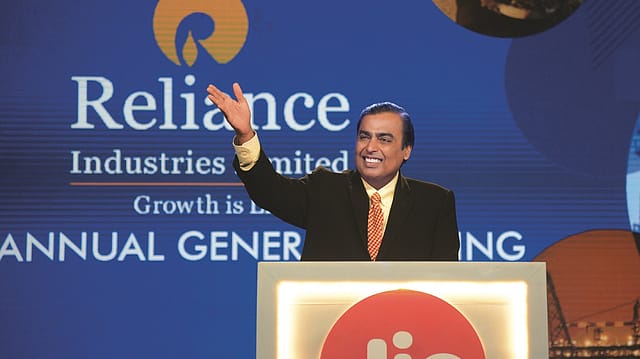RIL, BP announce new JV for fuel retailing
ADVERTISEMENT

India’s largest company by revenue Reliance Industries Ltd (RIL) and its British partner in the oil and gas business BP Plc announced the formation of a new joint venture on Tuesday to expand RIL’s existing fuel retailing business.
The new joint venture—in which 51% will be owned by Mukesh Ambani-led RIL and the remaining by BP—will build a pan-India fuel retail service station network and also sell aviation fuel to airliners. According to RIL’s earnings statement for the first quarter of FY20, RIL operated 1,378 fuel stations across the country. The new joint venture will expand this network to 5,500 outlets, the two companies said in a statement issued on Tuesday after market hours.
“India is expected to be the fastest-growing fuels market in the world over the next 20 years, with the number of passenger cars in the country estimated to grow almost six-fold over the period,” the statement said, explaining the rationale for expanding fuel retailing operations.
The oil-to-yarn and retail conglomerate’s joint venture with BP will also include its aviation fuel business, which currently operates at around 30 airports in India.
RIL had commissioned fuel retail outlets in India at a time when the prices of petrol and diesel were regulated by the government. It used to mostly sell diesel to trucks and buses plying on highways. At that time, RIL couldn’t efficiently compete with public sector oil marketing companies, which are responsible for most of the fuel retailed in India, since such fuel sold by the marketing companies was subsidised by the government to keep inflation in check. But eventually, in 2014, the government deregulated fuel prices, making it a level-playing field for all market participants in fuel retailing.
“Our robust partnership in developing gas resources in India has now expanded to fuel retailing and aviation fuels. This transformative partnership will deepen our engagement with the consumers in further enhancing the world-class services across the country,” RIL chairman Mukesh Ambani said in Tuesday’s statement.
Bob Dudley, group chief executive of BP, said in the same statement: “India is set to be the world’s largest growth market for energy by the mid-2020s. BP is already a large investor here and we see further attractive, strategic opportunities to support this growth.”
There are many innovations in fuel retailing that this partnership plans to bring to the Indian consumer. “The venture will seek to expand its reach, broadening access through mobile fuelling units and providing packaged fuel to customers, including home delivery,” the RIL-BP statement added.
The fuel retail outlets will also provide precious real estate for the Indian conglomerate’s retail arm, Reliance Retail, which has emerged as India’s largest retailer comprising multiple formats. Like in other countries, RIL-BP’s fuel pumps will feature convenience stores as well.
In 2008, RIL and BP agreed to cooperate for offshore exploration in India, Then in 2011, BP and RIL entered into their current partnership wherein BP acquired a 30% interest in RIL’s portfolio of exploration and production interests, including the KG D6 gas-producing block off the east coast. More recently, the partners have sanctioned three new gas developments in the KG D6 block since 2017. The two partners have invested around $2 billion in India till date and are investing another $5 billion to commercialise new gas fields.
RIL-BP’s announcement comes at a time when public sector oil marketing companies (OMCs)—Hindustan Petroleum Corp. Ltd, Bharat Petroleum Corp. Ltd and Indian Oil Corp. Ltd—have decided to double their network of fuel stations by setting up 78,000 new pumps across India. OMCs have around 90% market share in fuel retail in India.
“For private players, who primarily have retail outlets along highways, their share in sales of high-speed diesel is projected to increase to around 15% over the next 4-5 years, from the current 9.2%,” says a recent research report by credit rating agency CRISIL. “Motor spirit’s share, though, is expected to remain stable at the current level, or increase only marginally. In fact, their future plans are aligned to strengthen their network and corner a higher share of highway product sales.”
To put things in perspective, the Indian automotive industry is passing through one of its weakest phases ever, where carmakers are reporting declining sales and profitability month-on-month. Carmakers like Maruti Suzuki have decided to stop producing diesel cars altogether since they don’t think it will be cost effective for them to produce small diesel cars that run on diesel, post the introduction of BS-VI emission norms, slated to come into effect from April 1, 2020. Added to this, is the government’s thrust on the promotion of electric vehicles, which is expected to blunt future demand for petrol and diesel further.